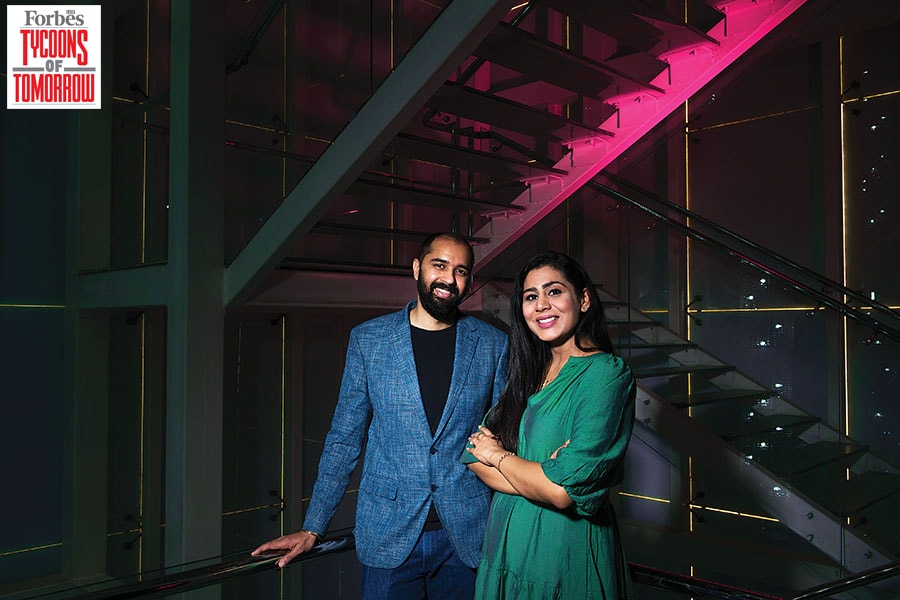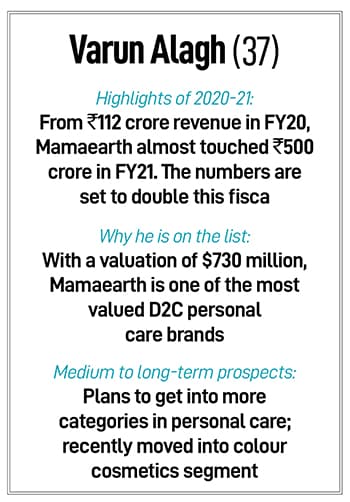Varun and Ghazal Alagh: Beauty tycoons with a purpose
Mamaearth's Alaghs are disrupting the personal care industry by making it more personal and extra caring


 Varun and Ghazal Alagh, co-founders of Mamaearth, say the brand’s purpose goes beyond earning revenue
Varun and Ghazal Alagh, co-founders of Mamaearth, say the brand’s purpose goes beyond earning revenue
Image: Amit Verma
In 2016, when Varun and Ghazal Alagh started Mamaearth, it was not another me-too baby care company. Staying away from plain vanilla offerings, the husband-wife duo rolled out toxin-free products, and went direct to consumers (D2C). “What’s the point in running a business without a purpose?" reckons Varun Alagh, co-founder and chief executive officer of Mamaearth. “For us, ESG [environmental, social and governance] is a way of life," contends the 37-year-old entrepreneur, explaining how Mamaearth practices what it preaches. The D2C personal care company is a plastic positive brand it recycles more than two times the amount of plastic it consumes it plants a sapling for every order placed on its website and is now working towards providing potable water across villages.
Five years later, the scale of purpose has become magnified with the scale of business operations. Revenues have leapfrogged from ₹22.19 lakh in FY17 to an astonishing ₹112 crore in FY20. The high-octane drive continues in FY21 as sales cross the ₹500-crore mark. The target for the present fiscal is to double to ₹1,000 crore. “We are well on track to do so," says Alagh, who closed a $50 million funding round in July, led by Belgian investment fund Sofina. The investment valued the brand at $730 million.
Alagh explains the levers of stratospheric growth. From baby care, hair care and skincare, Mamaearth diversified into body care and colour cosmetics. “New categories have pushed sales," he says. Aggressive marketing and advertising, coupled with product diversification, have done wonders. “We are reaching more households across India," he says. While earlier the focus was singularly on the top metros, the brand has been moving deep into Tier II and beyond. What has also helped is the move to have a sizeable presence across modern retail formats.
 The move to build a house of brands is also fuelling expansion and wider consumer adoption. In November, Honasa Consumer, the parent company of Mamaearth, rolled out its third brand Aqualogica. A skincare brand, Aqualogica underlines that Indian skin is not suited for oily skincare solutions. “We are approaching skincare from a science of hydration perspective," he says, adding that the second brand—The Derma Co—has also been growing at a fast clip.
The move to build a house of brands is also fuelling expansion and wider consumer adoption. In November, Honasa Consumer, the parent company of Mamaearth, rolled out its third brand Aqualogica. A skincare brand, Aqualogica underlines that Indian skin is not suited for oily skincare solutions. “We are approaching skincare from a science of hydration perspective," he says, adding that the second brand—The Derma Co—has also been growing at a fast clip.
Backers are delighted with the growth and vision of the company. What is interesting about Mamaearth, reckons Ishaan Mittal, managing director at Sequoia India, is the fact that they are going after a $20 billion FMCG industry, which has so far been traditional in its outlook and offerings. “No one approached it from a tech-first perspective. Mamaearth changed that," he says. Equally inspiring, Mittal lets on, is their brand purpose—“goodness inside"—which drives everything the company does. “We feel incredibly aligned as a team to founders who have a larger purpose," he says.
Alagh, for his part, asserts that the brand will always stay true to its purpose-driven mission. “Purpose has to be beyond revenues," he says, adding that Honasa is building a house of brands that get love from consumers and impact the lives of people. The blockbuster listing of Nykaa, he underlines, is a massive boost for new-age beauty and personal care companies in India.

So what next for Mamaearth? Definitely not an IPO, he clarifies. The company will stay focussed on growth over the next few quarters. “We have brought together personal and care," he signs off.
First Published: Dec 31, 2021, 11:56
Subscribe Now